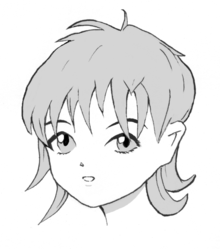Definify.com
Definition 2026
Manga
manga
manga
English

Quotations
For usage examples of this term, see Citations:manga.
Translations
|
|
|
|
Hyponyms
- doujinshi (“independent or fan-produced manga”)
Hypernyms
Related terms
- mangaka (manga author/artist)
Coordinate terms
See also
- anime (“Japanese animation”)
Catalan
Etymology
From Japanese 漫画 (manga), 漫 (man-) "random, uncontrolled" + 画 (-ga) "picture, sketch". After an 1814 book by Katsushika Hokusai.
Noun
manga m (plural mangues)
- manga (Japanese comic book)
Dutch
Pronunciation
- Hyphenation: man‧ga
Etymology
From Japanese 漫画 (manga), after an 1814 book by Katsushika Hokusai.
Noun
manga m (plural manga's, diminutive mangaatje n)
French
Etymology
Borrowing from Japanese 漫画 (manga)
Noun
manga m (plural mangas)
- a manga (comic originated in Japan)
- 2005 November 1, “Duck Action : 5 mangas inmangables ! [Duck Action: 5 Manga You Can't Miss!]”, in Picsou Magazine (non-fiction, in French), Disney Hachette Presse, page 27:
- Hiromu Arakawa is a young mangaka debuting when she sent her first project to a publisher. That short story became FullMetal Alchemist, one of the best-selling manga in Japan: 12 million copies!
- 2005 November 1, “Duck Action : 5 mangas inmangables ! [Duck Action: 5 Manga You Can't Miss!]”, in Picsou Magazine (non-fiction, in French), Disney Hachette Presse, page 27:
-
Osamu Tezuka est le plus grand dessinateur de manga. De 1947 à 1989, il dessine 150000 pages et crée d’innombrable séries : Astro Boy, le roi Léo, Metropolis, BlackJack, Les trois Adolf, Ayako, Phénix…
- Osamu Tezuka was the greatest manga artist. From 1947 to 1989, he drew 150,000 pages and created countless series: Astro Boy, Kimba the White Lion, Metropolis, Black Jack, Message to Adolf, Ayako, Phoenix…
-
Osamu Tezuka est le plus grand dessinateur de manga. De 1947 à 1989, il dessine 150000 pages et crée d’innombrable séries : Astro Boy, le roi Léo, Metropolis, BlackJack, Les trois Adolf, Ayako, Phénix…
-
Hypernyms
- bédé / BéDé / BD / bande dessinée
Related terms
Coordinate terms
Galician
Etymology 1
From Old Portuguese manga, from Latin manica.
Noun
manga f (plural mangas)
Etymology 2
Borrowing from Portuguese manga, from Malay mangga, from Tamil மாங்காய் (māṅkāy) from மா (mā, “mango species”) + காய் (kāy, “unripe fruit”).
Noun
manga f (plural mangas)
- mango (fruit)
Related terms
Gamilaraay
Pronunciation
- IPA(key): /manga/
Noun
manga
Synonyms
References
- (2003) Gamilaraay Yuwaalaraay Yuwaalayaay Dictionary
Italian
Etymology
Borrowing from Japanese 漫画 (まんが, manga).
Pronunciation
- IPA(key): /ˈman.ga/, [ˈmäŋgä]
- Hyphenation: màn‧ga
Noun
manga m (invariable)
Anagrams
Polish
Etymology
Pronunciation
- IPA(key): [ˈmaŋɡa]
Noun
manga f
Declension
Portuguese
Pronunciation
- (Portugal) IPA(key): /ˈmɐ̃.ɡɐ/
- Hyphenation: man‧ga
Etymology 1
From Old Portuguese manga, from Latin manica. Cognate with Spanish manga, French manche.
Noun
manga f (plural mangas)
Quotations
For usage examples of this term, see Citations:manga.
Etymology 2
Borrowing from Malay mangga, from Tamil மாங்காய் (māṅkāy) from மா (mā, “mango species”) + காய் (kāy, “unripe fruit”).
Noun
manga f (plural mangas)
Quotations
For usage examples of this term, see Citations:manga.
Synonyms
- (tree): mangueira
Spanish
Etymology 1
From Latin manica, cognate with Portuguese manga, French manche.
Noun
manga f (plural mangas)
Related terms
Etymology 2
Borrowing from Japanese.
Noun
manga m (plural mangas)
Etymology 3
Verb
manga
- Formal second-person singular (usted) present indicative form of mangar.
- Third-person singular (él, ella, also used with usted?) present indicative form of mangar.
- Informal second-person singular (tú) affirmative imperative form of mangar.
